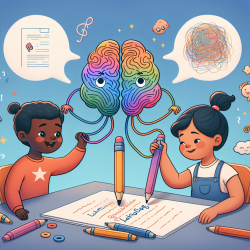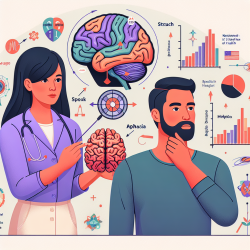Introduction
In the ever-evolving field of speech-language pathology, the integration of data-driven tools and methodologies is crucial for enhancing outcomes, especially for children and adolescents. The recent study titled "Perceived Physical Literacy Instrument for Adolescents: A Further Validation of PPLI" provides valuable insights into assessing and improving physical literacy among adolescents. This blog post aims to guide practitioners in leveraging the findings of this study to enhance their practice and encourage further research.
Understanding the PPLI
The Perceived Physical Literacy Instrument (PPLI) is a validated tool designed to measure adolescents' self-perception of physical literacy. Physical literacy encompasses various attributes, including motivation, confidence, physical competence, and the knowledge and understanding necessary for lifelong engagement in physical activity. The study conducted by Sum et al. (2018) confirms the reliability and validity of the PPLI in assessing these attributes among adolescents.
Key Findings and Implications for Practice
The study's confirmatory factor analysis revealed a three-factor structure of physical literacy, comprising:
- Sense of Self and Self-Confidence: Adolescents' self-perception of their physical fitness and self-management skills.
- Self-Expression and Communication: The ability to express oneself and communicate effectively through physical activities.
- Knowledge and Understanding: Awareness of the benefits of physical activity and a positive attitude towards sports.
These factors were found to be invariant across gender, indicating that the PPLI can be applied universally among adolescents. For practitioners, this means that the PPLI can serve as a reliable tool to assess and tailor interventions aimed at enhancing physical literacy and, consequently, overall health outcomes.
Practical Applications
Practitioners can utilize the PPLI to:
- Assess Baseline Physical Literacy: Use the PPLI to establish a baseline understanding of an adolescent's physical literacy, which can inform personalized intervention strategies.
- Design Targeted Interventions: Develop programs that focus on enhancing specific attributes of physical literacy, such as self-confidence or communication skills, based on individual PPLI scores.
- Monitor Progress: Regularly administer the PPLI to track changes in physical literacy over time, adjusting interventions as needed to optimize outcomes.
Encouraging Further Research
While the PPLI provides a robust framework for assessing physical literacy, further research is needed to explore its applications across diverse populations and settings. Practitioners are encouraged to engage in research that examines the impact of physical literacy on various health outcomes, including mental health and social development.
To read the original research paper, please follow this link: Perceived physical literacy instrument for adolescents: A further validation of PPLI.










